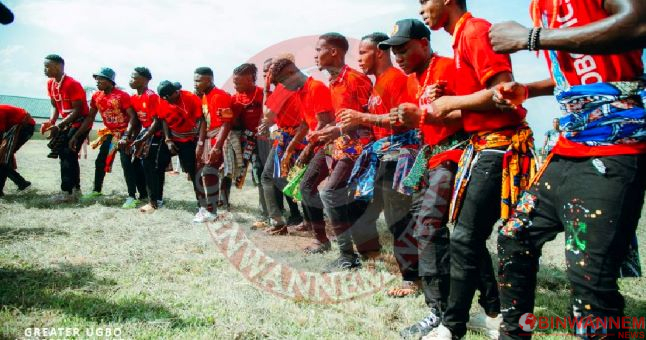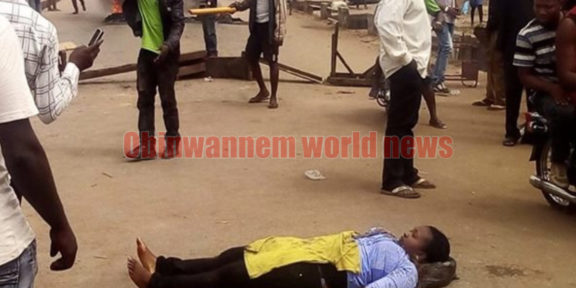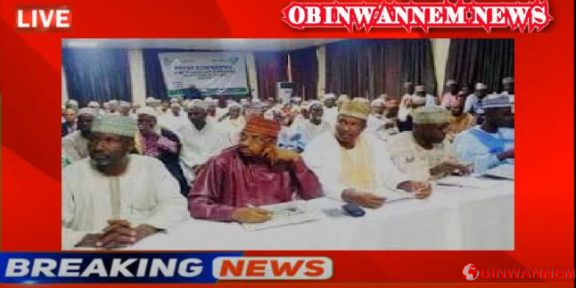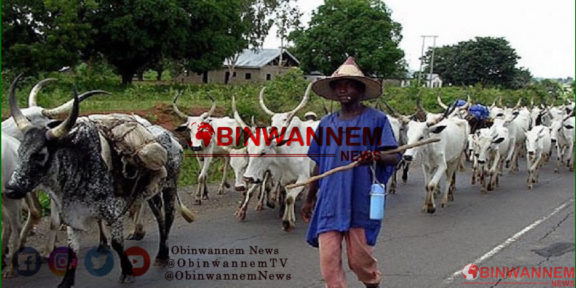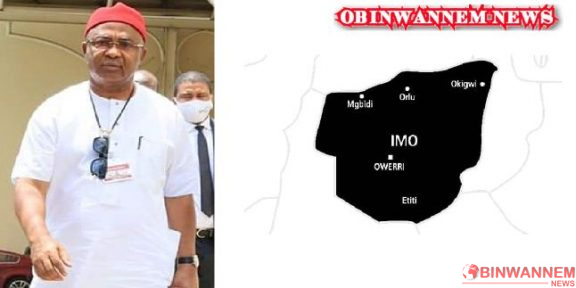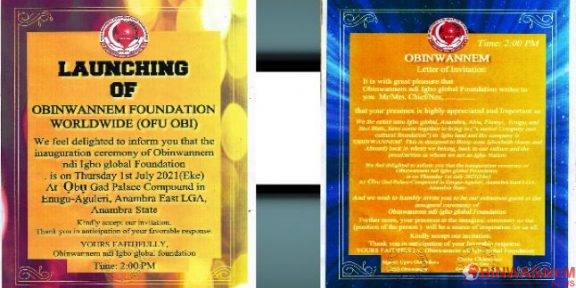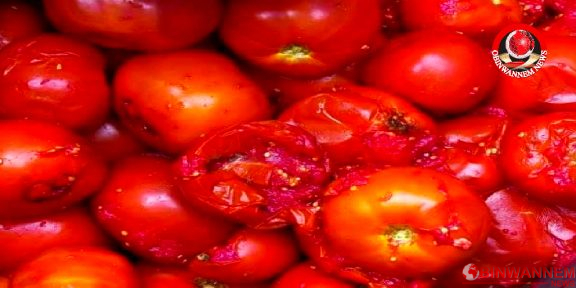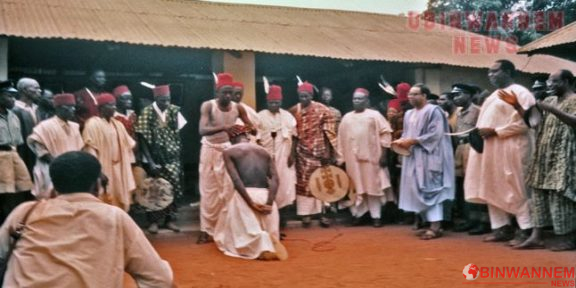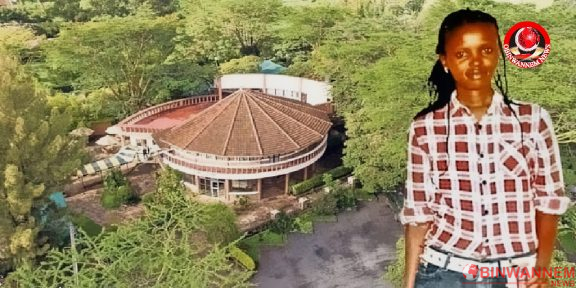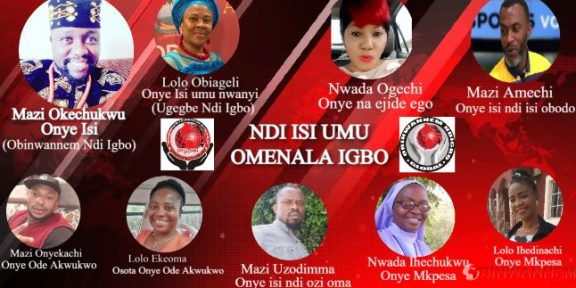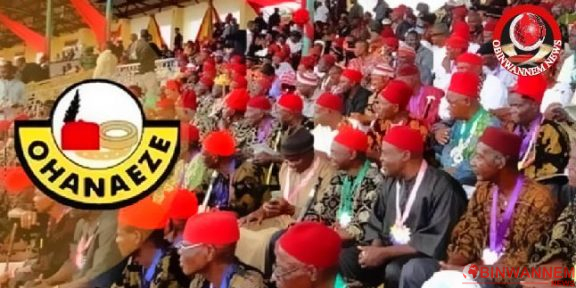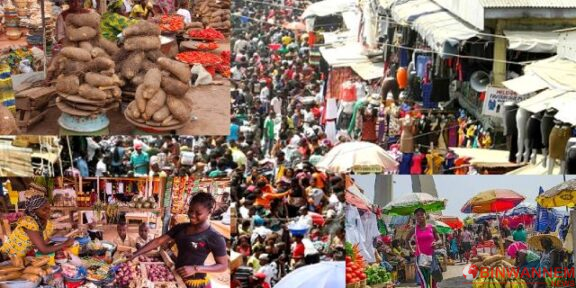Aju festival is a Rite of Passage, performed every three years to mark the transition from adolescents to manhood for males between the ages of 19 and 23.
Aju festival is one of the major cultural landmarks in Ugbo traditional calendar and a significant process in, not just Ugbo, but also in many Igbo societies. The celebrants are males between the ages of 19 and 23. The rite of passage, called Iwa Akwa (clothing) is the most cherished festival in the life of every Ugbo indigene.
Aju festival dates back to Ugbo history. Our ancestors conceived it as a classificatory process of grouping males into specific age-grades for smooth and effective communal administration.
On the other hand, both seniority and age-grade are seriously emphasized such that in Ugbo, old age goes with honour, dignity and gerontocratic rights. Iwa Akwa involves various social processes aimed at initiating the adolescents into manhood as well as bonding the members of the age-grade across the entire hamlets of Ugbo. Three days are usually set aside for the major processes:
Day 1-Orie Day: All the celebrants from the kindred would converge with pomp and pageantries at their hamlet square before they proceed to the village square specifically for the purpose of Iwa Akwa.
The major hallmark of this day is that almost all the daughters (Umuada) of Ugbo, both far and near are obligated to appreciate the celebrants from their own kindred with various kinds of gift.
Day 2- On the next day, Afor, all the celebrants are inducted into the Ugbo cosmology through the Mgbaheishi. By this orientation, all the celebrants are compelled to trek through the ancestral foot paths, round the major hamlets in Ugbo; ascending and descending the Ugbo hills, crossing the rivers and streams, etc . Most importantly, they are expected to lavishly display vigour, enthusism and agility in about 15 hamlet squares in Ugbo.
Their flutes and songs would always indicate their location at any particular time. This is strictly arranged such that the celebrants of Ugbo Okpala do not meet and clash with those of Ugbonabo, neither would Ugbonabo encounter the Ngene – Ugbo celebrants. The parents and relatives would wait anxiously until their sons return from Mgbaheishi.
3. The grand finale, called Ozuzugboligbo comes up on the next Orie market day. It officially and publicly unites all the celebrants of the three components of Ugbo at Ugbonabo, the ancestral centre of Ugbo activities.
The initiates are in the process, fully incorporated and enculturated into the core Ugbo spiritual essence and cultural heritage. Apart from impacting the Ugbo consciousness in the initiated, the Iwa Akwa confers on the celebrant all the privileges, rights, dignity and profound sense of belonging in the Ugbo society.
Iwa- Akwa also goes with some challenges. The celebrants are reminded as in Corinthians, 13 Vs 11: “As a child, I spoke, thought and understood as a child. Now, as a man, you must put away all the childish things’’. It is the occasion for the central message: Go ye into the world, tread cautiously as an Ugbo indigene with an achievement ambience. Put differently, any male who has not performed the Iwa Akwa ceremony is considered a minor in the Ugbo world view. Going by the standards of Ugbo custom and tradition, such a minor may not only be allowed to marry but will not be entrusted with serious responsibilities in the community.
Expectedly, every Ugbo parent looks forward with emotional excitement; to a day his/her son will perform the Iwa Akwa ceremony. It is considered a thing of immense joy for a parent to witness the rite of passage of his/her son. It is greeted with enormous fanfare, gunshots, feasts, dancing groups, etc. Because of the relevance attached to the Aju festival, all sons, daughters and friends of Ugbo both at home and in the Diaspora usually strive to participate in the festival.
The Exemplary Ugbo Culture in the Global Context Professor Manu Ampin corroborates that there are five major African initiation rites. They are the rights of birth, passage, marriage, eldership and ancestorship.
Rite of Birth
The rite of birth is the initiation of the child through a naming ceremony. A newly born child is a canvass of diverse possibilities. The Ugbo ancestors had long realized that names have spiritual vibrations upon the life of the bearer. In the traditional African cosmology, names are verified to determine their impacts on the personality, talent and mission in life before they are pronounced on the child by the eldest man, in the presence of the relatives. The person grows up to assume the roles and expectations of such name. In Ugbo, this is called Mfuta Omugwo, equivalent to the Christian baptism. In each case, a form of mystification is involved. The name of the child thus pronounced, becomes the essential part of his personality for life.
Rite of Passage
The rite of passage as observed by Professor Ampin, is the Ugbo equivalent of Iwa akwa, performed to mark the transition from adolescence to adulthood. The equivalence of the rite of passage in the Western culture is the university convocation. It is often between the ages of 19 and 23.
The persons so initiated are reminded that they have become adults and thus expected to fulfill roles that are incumbent on adults. On the Aju grand finale, a new set of boys matriculates, in what we call Ibanakwa. The occasion witnesses both matriculation and convocation as it obtains in the western culture.
Rite of Marriage
This is the joining of the two missions of two separate persons into a soulful unity, as a couple (Genesis 2:24). Marriage is not only for procreation, it helps the couple fulfill their missions and objectives in society. The unmarried persons are not taken seriously in the Ugbo world view. And for this reason, a man shall leave his father and mother and hold fast to his wife. (Matthew 19:5). Just as cutting of the cake is observed in the western culture, the Ugbo people use Egusi cake, Iho, to consummate every marriage.
Rite of Eldership
The rite of eldership is performed in all parts of Igbo land with little variations. In Ugbo, it is the title taking. It takes the form of Okotalukwe or jiebine, Ogbuefi, Onyioha (Ozo) and Mazi.
After the ceremony, the celebrant is looked upon as a model worthy of emulation. He is seen as a man of distinction. In every gathering, his views are sought. He is not easily challenged on account of his status and most times, wisdom. Among the Christendom, knighthood and other forms of recognition are used to express such distinction.
Rite of Death & Ancestorship
This is the rite performed to enable a dead relative transit fully into the spirit world.
The African philosophy believes that to perform the required funeral ceremony for the deceased who lived well on earth would facilitate his integration among the ancestors or ambassadors in the spirit world. And, thereafter, he would come back to life through a new born baby. This phenomenon called reincarnation (Ino Uwa) is fundamental in Igbo conception of reality.
Another striking Ugbo cultural universalism is the concept of Nnam and Nnem as names reserved for the father and mother in-laws respectively. In England parents of one’s wife are referred to as father and mother in laws, just as they are called Nnam and Nnem in Ugbo.
Lolo Ijeoma Njoku Obinwannem News Writer / Nov 25, 2021


